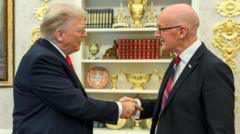
The blossoming relationship between Trump and Swinney
The politicians are at odds on a whole range of issues – but something has fundamentally changed in their relationship.

The politicians are at odds on a whole range of issues – but something has fundamentally changed in their relationship.
In recent months, the dynamic between former President Donald Trump and Michigan Governor Gretchen Whitmer has shifted notably, despite their stark political differences. Once characterized by sharp critiques and partisan divides, their interactions have taken on a new tone, indicating a potential thaw in their relationship. This change is particularly intriguing given the backdrop of ongoing political tensions in the United States.
The evolution of their relationship can be traced back to several key moments. Following the devastating impacts of the COVID-19 pandemic, both leaders have found themselves navigating similar challenges, albeit from different political platforms. Whitmer's emphasis on public health and safety measures often clashed with Trump's more relaxed approach. However, as the pandemic has waned and recovery efforts have ramped up, the two have begun to engage more constructively on certain issues, such as infrastructure development and economic recovery.
One of the most significant developments in their relationship has been their mutual interest in securing federal funds for infrastructure projects. As both politicians recognize the crucial need for investment in transportation and utilities to support their constituents, they have found common ground, leading to discussions that were previously unthinkable. This pragmatic approach suggests that, despite ideological differences, they are willing to collaborate for the benefit of Michigan residents.
Moreover, Whitmer has publicly acknowledged the importance of bipartisan efforts in addressing critical issues. In her recent statements, she emphasized that the challenges faced by states require cooperation across party lines. This sentiment appears to resonate with Trump, who, while still staunchly defending his political base, has expressed a willingness to work with state leaders from both parties when it aligns with his agenda.
The shift in their relationship has not gone unnoticed by political analysts and observers. Many speculate that this newfound cooperation may be a strategic move for both politicians. For Trump, aligning with a prominent Democratic governor could help bolster his image as a leader who prioritizes results over partisanship, especially as he gears up for a potential presidential run in 2024. For Whitmer, engaging with Trump might allow her to secure much-needed resources for Michigan while also demonstrating her commitment to effective governance.
As their relationship continues to evolve, the implications for governance in Michigan and beyond are significant. A collaborative approach could pave the way for more effective responses to pressing issues such as climate change, economic inequality, and public health. If both leaders can navigate their ideological differences and focus on practical solutions, it could serve as a model for other states grappling with similar challenges.
However, this budding relationship is not without its critics. Some progressive voices within Whitmer's party express concern that working with Trump might undermine her credibility among Democrats. Conversely, Trump's base may view any cooperation with a Democratic governor as a betrayal. The delicate balance between collaboration and partisanship will be crucial as both leaders move forward.
Looking ahead, it remains to be seen how this relationship will impact their respective political futures. As the landscape continues to change, both Trump and Whitmer will need to navigate their constituents' expectations while balancing their political ambitions. Their ability to unite on shared goals while managing their differences will ultimately determine the success of their partnership.
The unfolding narrative between Trump and Whitmer serves as a reminder of the complexities of political relationships in a polarized environment. As they explore this new dynamic, it invites broader discussions about the potential for bipartisanship in an era marked by division and discord.